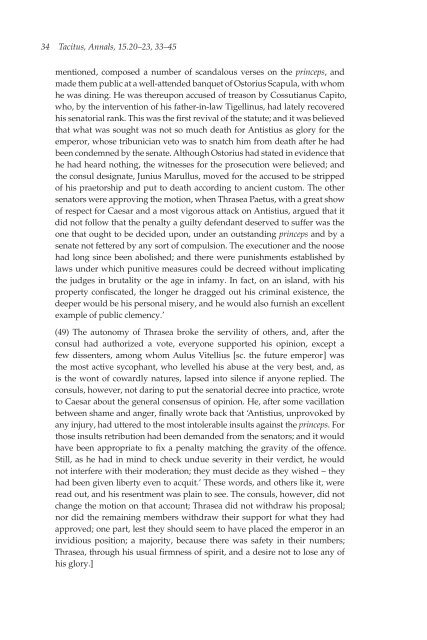Tacitus, Annals, 15.20-23, 33-45. Latin Text, Study Aids with Vocabulary, and Commentary, 2013a
Tacitus, Annals, 15.20-23, 33-45. Latin Text, Study Aids with Vocabulary, and Commentary, 2013a
Tacitus, Annals, 15.20-23, 33-45. Latin Text, Study Aids with Vocabulary, and Commentary, 2013a
You also want an ePaper? Increase the reach of your titles
YUMPU automatically turns print PDFs into web optimized ePapers that Google loves.
mentioned, composed a number of sc<strong>and</strong>alous verses on the princeps, <strong>and</strong><br />
made them public at a well-attended banquet of Ostorius Scapula, <strong>with</strong> whom<br />
he was dining. He was thereupon accused of treason by Cossutianus Capito,<br />
who, by the intervention of his father-in-law Tigellinus, had lately recovered<br />
his senatorial rank. This was the first revival of the statute; <strong>and</strong> it was believed<br />
that what was sought was not so much death for Antistius as glory for the<br />
emperor, whose tribunician veto was to snatch him from death after he had<br />
been condemned by the senate. Although Ostorius had stated in evidence that<br />
he had heard nothing, the witnesses for the prosecution were believed; <strong>and</strong><br />
the consul designate, Junius Marullus, moved for the accused to be stripped<br />
of his praetorship <strong>and</strong> put to death according to ancient custom. The other<br />
senators were approving the motion, when Thrasea Paetus, <strong>with</strong> a great show<br />
of respect for Caesar <strong>and</strong> a most vigorous attack on Antistius, argued that it<br />
did not follow that the penalty a guilty defendant deserved to suffer was the<br />
one that ought to be decided upon, under an outst<strong>and</strong>ing princeps <strong>and</strong> by a<br />
senate not fettered by any sort of compulsion. The executioner <strong>and</strong> the noose<br />
had long since been abolished; <strong>and</strong> there were punishments established by<br />
laws under which punitive measures could be decreed <strong>with</strong>out implicating<br />
the judges in brutality or the age in infamy. In fact, on an isl<strong>and</strong>, <strong>with</strong> his<br />
property confiscated, the longer he dragged out his criminal existence, the<br />
deeper would be his personal misery, <strong>and</strong> he would also furnish an excellent<br />
example of public clemency.’<br />
(49) The autonomy of Thrasea broke the servility of others, <strong>and</strong>, after the<br />
consul had authorized a vote, everyone supported his opinion, except a<br />
few dissenters, among whom Aulus Vitellius [sc. the future emperor] was<br />
the most active sycophant, who levelled his abuse at the very best, <strong>and</strong>, as<br />
is the wont of cowardly natures, lapsed into silence if anyone replied. The<br />
consuls, however, not daring to put the senatorial decree into practice, wrote<br />
to Caesar about the general consensus of opinion. He, after some vacillation<br />
between shame <strong>and</strong> anger, finally wrote back that ‘Antistius, unprovoked by<br />
any injury, had uttered to the most intolerable insults against the princeps. For<br />
those insults retribution had been dem<strong>and</strong>ed from the senators; <strong>and</strong> it would<br />
have been appropriate to fix a penalty matching the gravity of the offence.<br />
Still, as he had in mind to check undue severity in their verdict, he would<br />
not interfere <strong>with</strong> their moderation; they must decide as they wished – they<br />
had been given liberty even to acquit.’ These words, <strong>and</strong> others like it, were<br />
read out, <strong>and</strong> his resentment was plain to see. The consuls, however, did not<br />
change the motion on that account; Thrasea did not <strong>with</strong>draw his proposal;<br />
nor did the remaining members <strong>with</strong>draw their support for what they had<br />
approved; one part, lest they should seem to have placed the emperor in an<br />
invidious position; a majority, because there was safety in their numbers;<br />
Thrasea, through his usual firmness of spirit, <strong>and</strong> a desire not to lose any of<br />
his glory.]


















